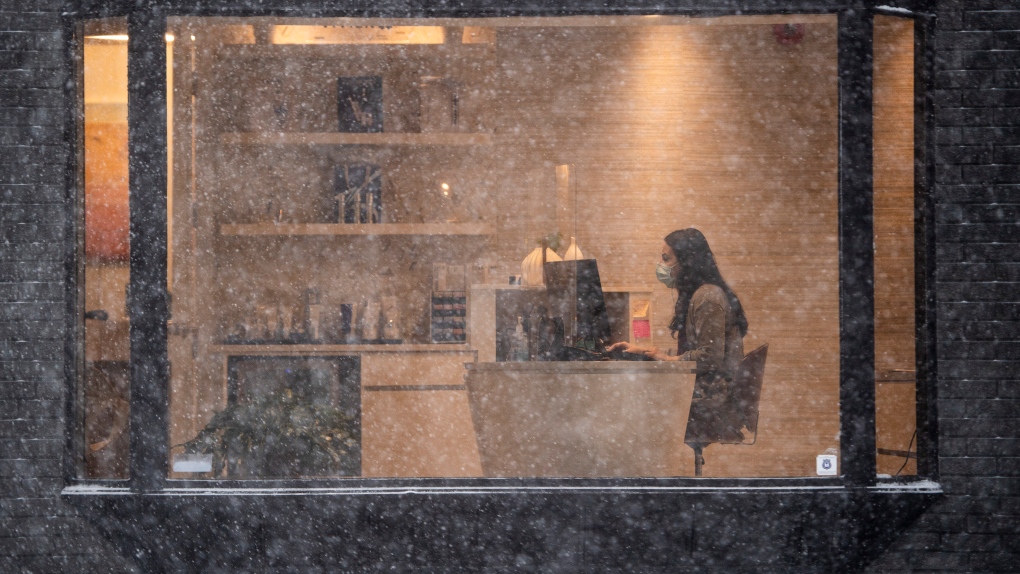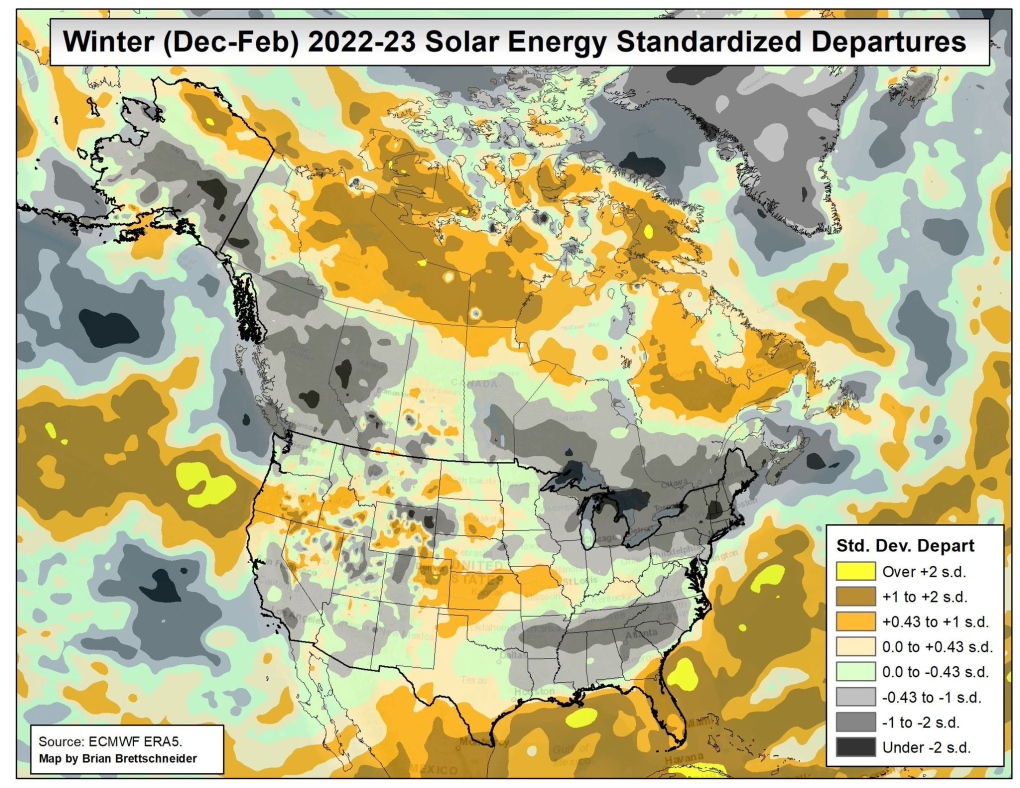Ontario just lived through one of the darkest winters in more than 80 years
 A person works inside a business as snow falls outside in Ottawa, on Monday, Jan. 17, 2022. THE CANADIAN PRESS/Justin Tang
A person works inside a business as snow falls outside in Ottawa, on Monday, Jan. 17, 2022. THE CANADIAN PRESS/Justin Tang
If you found yourself pining for some sunshine in Ontario in recent months, it’s likely because the province just lived through one of the darkest winter seasons in nearly a century.
According to solar energy data by The European Centre for Medium Range Forecasting (ECMRF), parts of Ontario saw lower levels of solar energy between December 2022 and February 2023 than previously recorded in the last 83 years, or since 1940.
The lack of sun was noticed by a climatologist with the Alaska Region of the United States National Weather Service, Brian Brettschneider, while reviewing the ECMRF’S dataset.
“I just basically wanted to see how much solar energy we got this winter, and so that drove me to make this map,” Brettschneider told CTV News Toronto Wednesday.
The maps reflect solar deviations, which are measurements used to describe how much solar energy a region is getting compared to what is typical in that area.
Within Brettschneider’s maps, areas in the black zones, such as Tobermory, Collingwood, the Manitoulin region, Prince Edward County, and the area of eastern Lake Ontario, all saw the most drastic lack of solar energy in Ontario this winter.
 Source: Brian BrettschneiderThe worst month for lack of solar energy in Ontario was January, Brettschneider said.
Source: Brian BrettschneiderThe worst month for lack of solar energy in Ontario was January, Brettschneider said.
“December was actually pretty typical, and February was below normal, but January was exceptionally low,” he said.
During the first weeks of January, the Greater Toronto Area went without a sunny day for more than two weeks, according to The Weather Network. London, Ont. went without a sunny day from Dec. 4, 2022, to Jan 8, 2023, the agency added.
Brettschneider said periods without sun, such as the one experienced by Ontario in January, can have a psychological impacts.
"Having some sunshine tends to greatly improve people's moods and so without that sunshine in many locations, it contributed to a sense of dreariness this winter," he said.
WHY DID ONTARIO HAVE A DARK WINTER?
According to Brettschneider, Ontario’s unusually dark winter occurred due to a number of factors.
“Some years, large-scale atmospheric patterns can [be] blocked from moving with very much speed,” he explained. This year, he said, Ontario saw a prolonged blocking period where an area of high pressure remained over the eastern part of the lower 48 United States.
“The flow around that was clockwise, and that sent lots of moisture and cloud coverage toward the Great Lakes region,”he said. “That meant, with all those clouds, there was not much solar activity compared to typical years.”
ONTARIO SPRING FORECAST
As Ontario hurtles towards spring, warmer temperatures and sunny days are in the forecast.
The Greater Toronto Area is set to see a number of spring-like days at the start of next week. Monday and Tuesday are both forecast to be sunny and 5 C, according to Environment Canada.
The first day of spring is March 20, but residents won’t be able to say goodbye to winter weather for good just yet.
According to The Farmer’s Almanac, southern Ontario and the Great Lakes area will face snow and slushy weather into early April. In mid-to-late April, the province should expect more showers than usual alongside periods of stormy weather, the forecast predicts.
CTVNews.ca Top Stories

Poilievre writes to GG calling for House recall, confidence vote after Singh declares he's ready to bring Liberals down
Conservative Leader Pierre Poilievre has written to Gov. Gen. Mary Simon, imploring her to 'use your authority to inform the prime minister that he must' recall the House of Commons so a non-confidence vote can be held. This move comes in light of NDP Leader Jagmeet Singh publishing a letter stating his caucus 'will vote to bring this government down' sometime in 2025.
At least 2 dead and 60 hurt after a car drives into a German Christmas market in a suspected attack
A car plowed into a busy outdoor Christmas market in the eastern German city of Magdeburg on Friday, killing at least two people and injuring at least 60 others in what authorities suspect was an attack.
Judge sentences Quebecer convicted of triple murder who shows 'no remorse'
A Quebecer convicted in a triple murder on Montreal's South Shore has been sentenced to life in prison without chance of parole for 20 years in the second-degree death of Synthia Bussieres.
'I understand there's going to be a short runway,' new minister says after Trudeau shuffles cabinet
Prime Minister Justin Trudeau added eight Liberal MPs to his front bench and reassigned four ministers in a cabinet shuffle in Ottawa on Friday, but as soon as they were sworn-in, they faced questions about the political future of their government, and their leader.
U.S. House approves funding bill and sends to Senate hours before government shutdown deadline
Hours to go before a midnight government shutdown, the House has approved a new plan from House Speaker Mike Johnson.
Poilievre to Trump: 'Canada will never be the 51st state'
Conservative leader Pierre Poilievre is responding to U.S. president-elect Donald Trump’s ongoing suggestions that Canada become the 51st state, saying it will 'never happen.'
A new book about Chrystia Freeland just came out. Here's what we learned
A new book about Chrystia Freeland has just come out, after the publishing company sped up its release date by a few months. CTV News sifted through the book and pulled out some notable anecdotes, as well as insights about Freeland's relationship with the prime minister.
Kelly Clarkson's subtle yet satisfying message to anyone single this Christmas
The singer and daytime-talk show host released a fireside video to accompany her 2021 holiday album, “When Christmas Comes Around” that she dubbed, “When Christmas Comes Around…Again.
Toronto officials warn of possible measles exposure at Pearson airport
Toronto Public Health (TPH) is advising of another possible measles exposure at Canada’s largest airport.

































